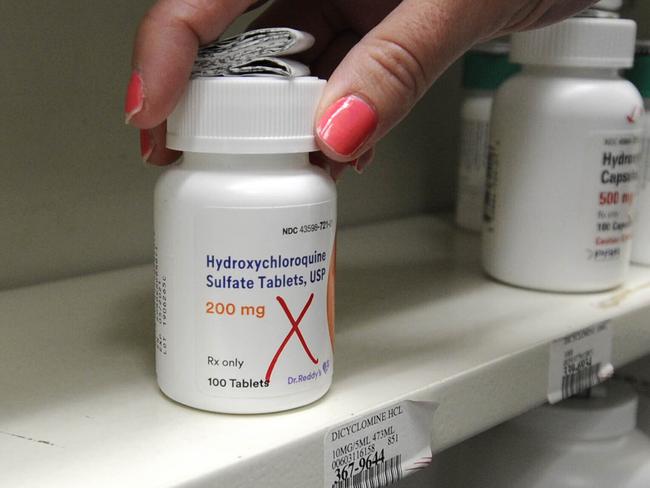Australians with coronavirus will be given hydroxychloroquine
There’s limited evidence it works to treat coronavirus and the risk of significant adverse effects is well known. Yet a drug used to treat malaria will be given to Aussie patients with the virus.
Coronavirus
Don't miss out on the headlines from Coronavirus. Followed categories will be added to My News.
Australians have been warned they may be risking their lives if they take malaria drug hydroxychloroquine to treat COVID-19 and it is unclear if it even works.
NPS Medicinewise, a government-funded body that encourages the safe use of medicines, said despite news reports from around the world touting the treatment as wonder drug it was still in the testing phase.
The medicine “should only be used by people with COVID-19 in a clinical trial setting or for severely ill patients in hospital,” said Nerida Packham, a pharmacist and Medicines Line manager at NPS MedicineWise.
The drug has been used for years to treat malaria, rheumatoid arthritis and lupus and is now in short supply after doctors and dentists began prescribing it off label during COVID-19.
The Australian government has placed restrictions on access to the medication to preserve supply for those who need it most.
US President Donald Trump caused a world-wide run on the drug when he tweeted that it was showing promise in treating COVID-19.
There has been growing criticism of the initial small scale French study that indicated the drug would be of use in COVID-19.

Hydroxychloroquine is expected to be trialled on COVID-19 patients in Australia as part of a study due to take place in over 60 hospitals.
“Further studies are needed to assess whether hydroxychloroquine is effective against COVID-19 outside of the hospital setting, and there is only very limited evidence of effectiveness in hospitals,” Ms Packham said.
“Quite simply, we don’t yet know whether it is effective and how to use it for COVID-19.”
If used incorrectly, hydroxychloroquine can be toxic to the heart (leading to a heart attack or heart failure), to the eyes (leading to irreversible damage), and to blood sugar levels (leading to severely low blood sugar).
“It is particularly important to be medicinewise during the COVID-19 pandemic. This means following the latest medical advice, based on the latest evidence from trusted sources,” Ms Packham said.
Former federal politician Clive Palmer, who pledged to make 1m doses of the drug, has an arrangement with the commonwealth to provide the drug.
“It is anticipated that medicines containing hydroxychloroquine sulfate will be made available to the national medical stockpile from a number of pharmaceutical companies,” a government told The Guardian.
“Some of these include generous donations funded by Mr Clive Palmer.”
The Pharmaceutical Society of Australia (PSA) reported last month chemists were receiving off label prescriptions from doctors prescribing the drug for other doctors and their families; as well as dentists prescribing to the community and their families.
These frontline health workers were probably hoping the drug could protect them if they caught COVID-19 from patients but there is no medical evidence yet that it works.
One in five doctors treating COVID-19 patients are using malaria drug hydroxychloroquine and it was rated as the most effective treatment according to a study of more 6000 doctors around the world.
Sermo, the largest global healthcare polling company and social platform for doctors surveyed more than 6200 physicians in 30 countries about the treatments they were using on COVID-19 patients.
It found the three most commonly prescribed treatments amongst COVID-19 treaters are 56 per cent pain killers (56 per cent), antibiotic azithromycin (41 per cent), and hydroxychloroquine (33 per cent).
Doctors rated hydroxychloroquine as the most effective therapy when presented with a list of 15 options, nearly four in 10 (37 per cent) of doctors rated it as the best treatment.
PSA president Associate Professor Chris Freeman wrote to chemists urging them to refuse to dispense hydroxychloroquine unless it was for inflammatory conditions or the suppression and treatment of malaria.

MORE NEWS
Mortgage holders desperate for cash relief
Harry Potter casting a spell on kids at home
Private health insurers on the nose
Easy explainer: Supermarket virus myths debunked
The run on the drug was making it hard for those who needed it to treat malaria and several auto-immune conditions to get their scripts filled.
“Recent reports of increased off-label prescribing of medicines containing hydroxychloroquine have raised concerns that this will create a potential shortage of this product in Australia,” the Therapeutic Goods Administration (TGA) said in a statement.
And there were concerns people may put their lives and eyesight at risk if they were using the drug for COVID-19.
When taken at high doses hydroxychloroquine can cause death, damage eyesight and cause psychotic episodes, anxiety, personality change and seizures.
“These medicines pose well-known serious risks to patients including cardiac toxicity (potentially leading to sudden heart attacks), irreversible eye damage and severe depletion of blood sugar (potentially leading to coma),” the TGA has warned.
Last week, the TGA placed restrictions on who could prescribe the drug.
As of March 24 it can only be prescribed by dermatologist, intensive care doctors, paediatricians, physicians and emergency medicine specialists.
GPs can only issue repeat prescriptions for the drug if patients were already using it before March 24.
Hydroxychloroquine is indicated for treating rheumatoid arthritis, lupus and the suppression and treatment of malaria.
Given the limited evidence for its effect against COVID-19, as well as the risk of significant adverse effects, the TGA said it “strongly discourages the use of hydroxychloroquine outside of its current indications at this time other than in a clinical trial setting or in a controlled environment in the treatment of severely ill patients in hospital”.
The drug will be included in a COVID-19 treatment trial in 60 Australian hospitals due to start next week.
The TGA said it was working with the pharmaceutical industry to help ensure supply of hydroxychloroquine is maintained for patients needing it to treat chronic conditions for which it is indicated.
The PSA said it would like to keep safe any stock of hydroxychloroquine held in local pharmacies – so it is available to treat patients who genuinely need this medicine.
“The only way this is possible is for prescribers to not write prescriptions for this medicine as a ‘just in case’ measure and for pharmacists to refuse the supply outside of these indications at this point in time,” Associate Professor Freeman said.
Originally published as Australians with coronavirus will be given hydroxychloroquine


